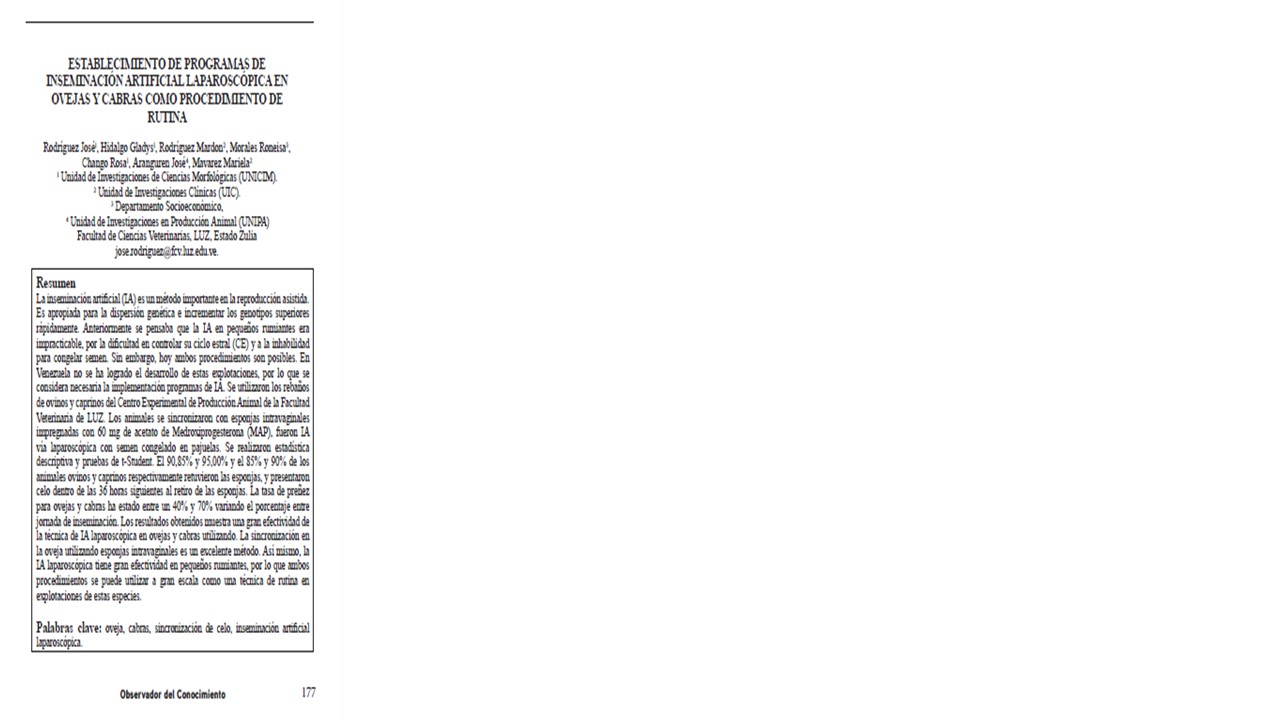Establishment of Laparoscopic Artificial Insemination Programs in Sheep and Goats as a Routine Procedure
Keywords:
Sheep, goats, heat synchronization, laparoscopic artificial inseminationAbstract
Artificial insemination (AI) is an important method in assisted reproduction. It is appropriate for the genetic dispersion and increase the superior genotypes quickly. Previously it was thought that AI in small ruminants was impractical, due to the difficulty in controlling their estral cycle (CE) and the inability to freeze semen. However, today both procedures are possible. In Venezuela, the development of these farms has not been achieved, which is why it is considered necessary to implement AI programs.The flocks of sheep and goats of the Experimental Center of Animal Production of the Veterinary School of LUZ were used. The animals were synchronized with intravaginal sponges impregnated with 60 mg of Medroxyprogesterone acetate (MAP), they were IA laparoscopically with semen frozen in straws.
Downloads
References
Buckrell, B. (2000). Reproductive Technologies Proceedings of the 6th Great Lakes Dairy Sheep Symposium, Guelph, Ontario, Canada. Pp.77-93.
Buckrell, B. C.; Halbert, G. W.; Garley, C. J.; Bretzlaff, K. N.; Rodríguez, F. (1991). Theriogenology handbook. “artificial insemination of small ruminant”. 4ed. Sydney.
Evans, G.; Maxwell W. (1990). Steven Salomón. Inseminación Artificial de Ovejas y Cabras. Editorial Acribia. Zaragoza, España. 204 pp.
Ishwar, A. K. (1995). Pregnancy diagnosis in sheep and goats: a review. Small Rumin. Res. 17:37.
Jackson, P. (1993). Laparoscopic procedures. pp 126. University of Sydney, NSW, Australia.
Minitab 15® Statistical Software for Windows®. 2006. Versión 15.
Navarro, L.; Ramírez, M.; Torres, A. (1987). Peso al nacer destete y seis meses de edad en corderos west african en la mesa de guanipa. Zotecnia Trop. 5(1, 2):41-57.
Rodríguez, J. M. (1996). Mortalidad embrionaria y morfofisiología de la implantación en ovejas en condiciones de competencia intrauterina.Tesis, M.Sc, Español.Facultad de Medicina Veterinaria y de Zootecnia. Universidad Nacional de Colombia. Bogotá. 107 pp.
Rodríguez, J. M. (2000). Evaluación proteíca del fluido luminal uterino, morfología del epitelio endometrial y vascularización del conceptus en la oveja durante los días 20, 28 y 35 de la preñez. Tesis Doctoral. Facultad de Medicina Veterinaria y de Zootecnia. Universidad Nacional de Colombia. Bogotá. 313 pp.
Rubianes, E.; Ibarra, D.; Underfeld, R.; Carbajal, B.; De Castro, T. (1995). Superovulatory response in anestrous ewes is affected by the presence of a large follicle. Theriogenology. 43: 465- 472.
Salamón, S. (1990). Inseminación Artificial de ovejas y cabras. Ed. Acribia. España, 1-171.
Vishwanath, R. (2003). Artificial insemination: the state of the art. Theriogenology. 59: 571-584.

Downloads
Published
How to Cite
Issue
Section
License

This work is licensed under a Creative Commons Attribution-NoDerivatives 4.0 International License.







